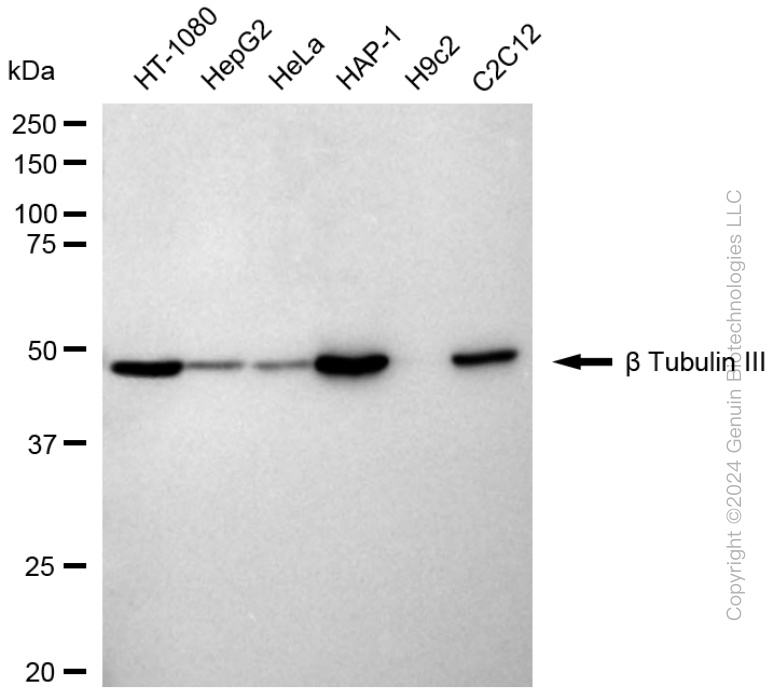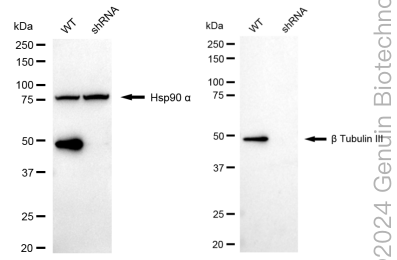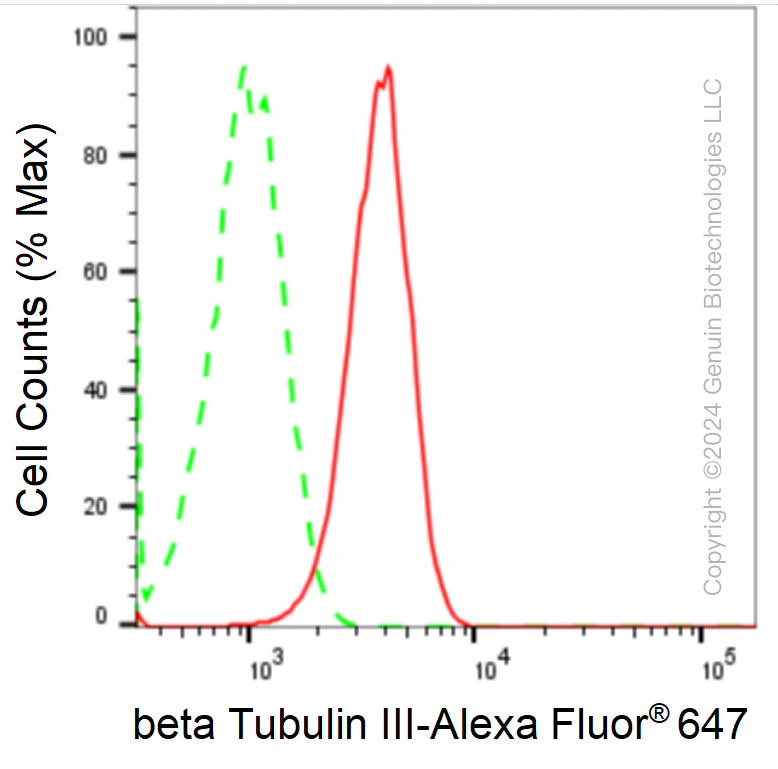KD-Validated Anti-Tubulin Beta 3 Class III Rabbit Monoclonal Antibody
Rabbit monoclonal antibody
- SPECIFICATION
- CITATIONS
- PROTOCOLS
- BACKGROUND

Application
| WB, FC |
|---|---|
| Primary Accession | Q13509 |
| Reactivity | Human, Mouse |
| Clonality | Monoclonal |
| Isotype | Rabbit IgG |
| Clone Names | 24GB1740 |
| Calculated MW | Predicted, 50 kDa , observed , 55 kDa |
| Gene Name | TUBB3 |
| Aliases | TUBB3; Tubulin Beta 3 Class III; CFEOM3A; Beta-4; CFEOM3; Class III Beta-Tubulin; Tubulin Beta-3 Chain; Tubulin Beta-4 Chain; Tubulin Beta-III; Tubulin, Beta 3; FEOM3; TUBB4; Fibrosis Of Extraocular Muscles, Congenital, 3; CDCBM1; CDCBM |
| Immunogen | A synthesized peptide derived from human beta Tubulin III |
| Gene ID | 10381 |
|---|---|
| Other Names | Tubulin beta-3 chain, Tubulin beta-4 chain, Tubulin beta-III, TUBB3, TUBB4 |
| Name | TUBB3 |
|---|---|
| Synonyms | TUBB4 |
| Function | Tubulin is the major constituent of microtubules, protein filaments consisting of alpha- and beta-tubulin heterodimers (PubMed:34996871, PubMed:38305685, PubMed:38609661). Microtubules grow by the addition of GTP-tubulin dimers to the microtubule end, where a stabilizing cap forms (PubMed:34996871, PubMed:38305685, PubMed:38609661). Below the cap, alpha-beta tubulin heterodimers are in GDP-bound state, owing to GTPase activity of alpha-tubulin (PubMed:34996871, PubMed:38609661). TUBB3 plays a critical role in proper axon guidance and maintenance (PubMed:20074521). Binding of NTN1/Netrin-1 to its receptor UNC5C might cause dissociation of UNC5C from polymerized TUBB3 in microtubules and thereby lead to increased microtubule dynamics and axon repulsion (PubMed:28483977). Plays a role in dorsal root ganglion axon projection towards the spinal cord (PubMed:28483977). |
| Cellular Location | Cytoplasm, cytoskeleton. Cell projection, growth cone {ECO:0000250|UniProtKB:Q9ERD7}. Cell projection, lamellipodium {ECO:0000250|UniProtKB:Q9ERD7}. Cell projection, filopodium {ECO:0000250|UniProtKB:Q9ERD7} |
| Tissue Location | Expression is primarily restricted to central and peripheral nervous system. Greatly increased expression in most cancerous tissues. |

Thousands of laboratories across the world have published research that depended on the performance of antibodies from Abcepta to advance their research. Check out links to articles that cite our products in major peer-reviewed journals, organized by research category.
info@abcepta.com, and receive a free "I Love Antibodies" mug.
Provided below are standard protocols that you may find useful for product applications.
If you have used an Abcepta product and would like to share how it has performed, please click on the "Submit Review" button and provide the requested information. Our staff will examine and post your review and contact you if needed.
If you have any additional inquiries please email technical services at tech@abcepta.com.














 Foundational characteristics of cancer include proliferation, angiogenesis, migration, evasion of apoptosis, and cellular immortality. Find key markers for these cellular processes and antibodies to detect them.
Foundational characteristics of cancer include proliferation, angiogenesis, migration, evasion of apoptosis, and cellular immortality. Find key markers for these cellular processes and antibodies to detect them. The SUMOplot™ Analysis Program predicts and scores sumoylation sites in your protein. SUMOylation is a post-translational modification involved in various cellular processes, such as nuclear-cytosolic transport, transcriptional regulation, apoptosis, protein stability, response to stress, and progression through the cell cycle.
The SUMOplot™ Analysis Program predicts and scores sumoylation sites in your protein. SUMOylation is a post-translational modification involved in various cellular processes, such as nuclear-cytosolic transport, transcriptional regulation, apoptosis, protein stability, response to stress, and progression through the cell cycle. The Autophagy Receptor Motif Plotter predicts and scores autophagy receptor binding sites in your protein. Identifying proteins connected to this pathway is critical to understanding the role of autophagy in physiological as well as pathological processes such as development, differentiation, neurodegenerative diseases, stress, infection, and cancer.
The Autophagy Receptor Motif Plotter predicts and scores autophagy receptor binding sites in your protein. Identifying proteins connected to this pathway is critical to understanding the role of autophagy in physiological as well as pathological processes such as development, differentiation, neurodegenerative diseases, stress, infection, and cancer.




